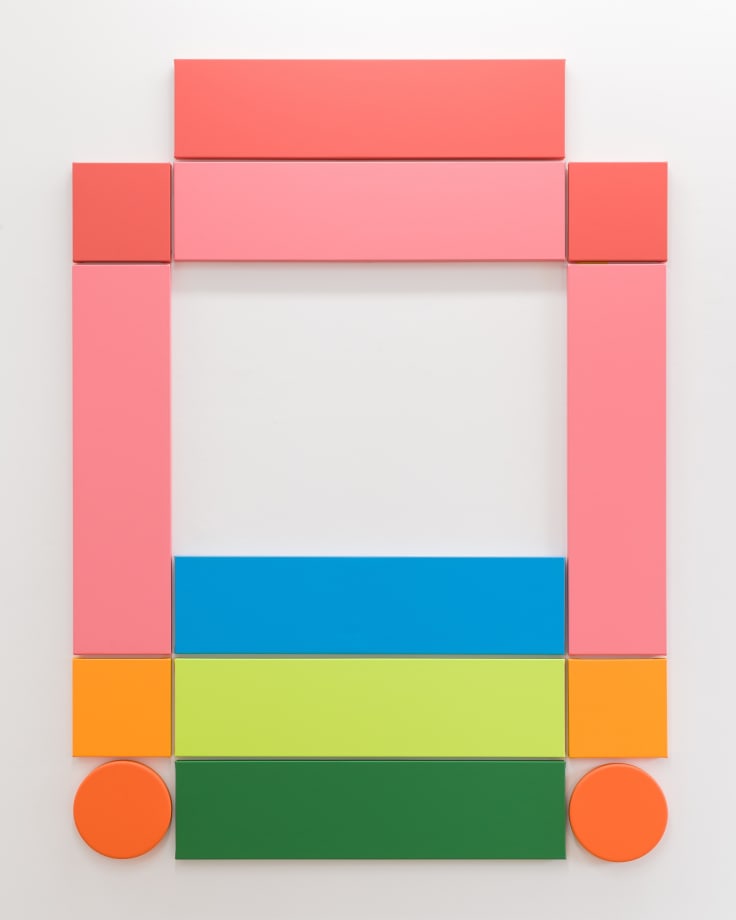The artist known as Ed Bats adopted a pseudonym during their days as a graffiti artist, covertly painting murals on streets around Aotearoa and across Europe. Perhaps as a result, Bats’ works are imbued with an architectural quality that is evident in both their physicality and construction.
Bats combines hard-edged abstraction with a minimalist aesthetic to create works that push at the limits of composition and form. The artist’s careful and constant working and re-working is laid bare in every stroke of paint, each exacting line or gesture. Often entire paintings are virtually obliterated, their surface painted over leaving only glimpses of the anterior colour and form beneath; similar to a graffiti wall that has been repeatedly whitewashed. Some works present a meticulous layering of vertical forms that have the appearance of architectural planes or structures stacked one behind another, others are physically constructed from multiple canvasses, while larger works see great swathes of flat vivid colour immersing the viewer and lending them a heightened optical quality.
Many works are more objects than paintings. In addition to constructed canvasses, the artist often incorporates second-hand furniture and household items – from window blinds to coffee tables – to create assemblages that oscillate between painting, sculpture, and installation. With a love of design and reviving vintage furniture, Bats revels in the process of making and constructing – from stretching their own canvases, to fabricating custom-made frames.
In Bats’ latest exhibition individual titles act as signposts leading the viewer this way and that, in a perpetual game of misdirection most evident in No go Heaphy road, where the artist literally leads us down a one-way street. Made up of thirteen individual canvasses, Oh yes you can comes off as a wry, positive affirmation; the title urging the artist (or the artwork itself) to break the rules, to disregard painting conventions in favour of an ingenuity and an aesthetic joy akin to that of children’s building blocks. Conversely, Look, see, don’t offers an equivocal warning while the faux earnestness of titles including Identity Crisis and Suburban Fever Dream is thrown off course by the absurdity of Monkey Island.
Bats combines hard-edged abstraction with a minimalist aesthetic to create works that push at the limits of composition and form. The artist’s careful and constant working and re-working is laid bare in every stroke of paint, each exacting line or gesture. Often entire paintings are virtually obliterated, their surface painted over leaving only glimpses of the anterior colour and form beneath; similar to a graffiti wall that has been repeatedly whitewashed. Some works present a meticulous layering of vertical forms that have the appearance of architectural planes or structures stacked one behind another, others are physically constructed from multiple canvasses, while larger works see great swathes of flat vivid colour immersing the viewer and lending them a heightened optical quality.
Many works are more objects than paintings. In addition to constructed canvasses, the artist often incorporates second-hand furniture and household items – from window blinds to coffee tables – to create assemblages that oscillate between painting, sculpture, and installation. With a love of design and reviving vintage furniture, Bats revels in the process of making and constructing – from stretching their own canvases, to fabricating custom-made frames.
In Bats’ latest exhibition individual titles act as signposts leading the viewer this way and that, in a perpetual game of misdirection most evident in No go Heaphy road, where the artist literally leads us down a one-way street. Made up of thirteen individual canvasses, Oh yes you can comes off as a wry, positive affirmation; the title urging the artist (or the artwork itself) to break the rules, to disregard painting conventions in favour of an ingenuity and an aesthetic joy akin to that of children’s building blocks. Conversely, Look, see, don’t offers an equivocal warning while the faux earnestness of titles including Identity Crisis and Suburban Fever Dream is thrown off course by the absurdity of Monkey Island.

